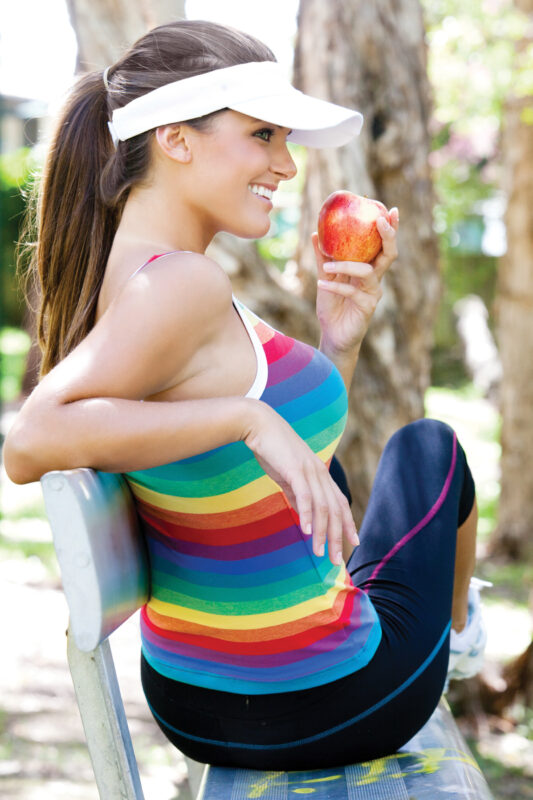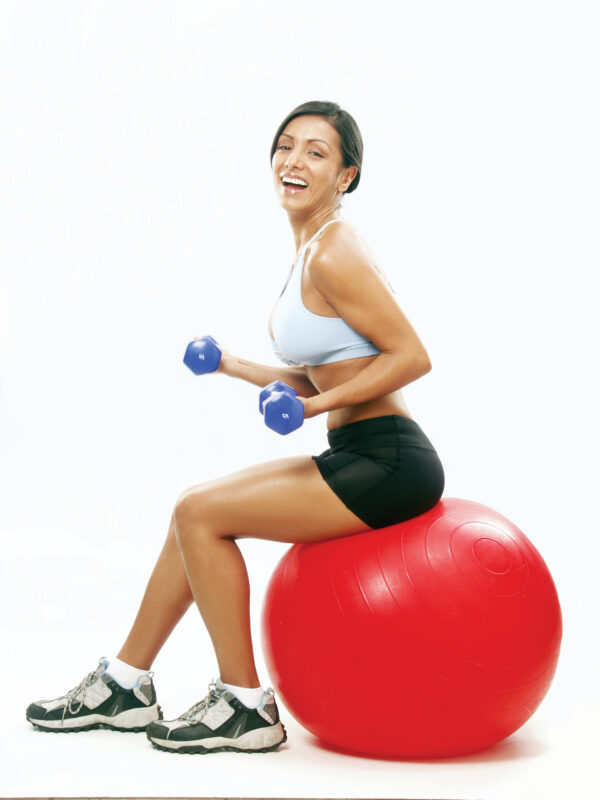Want to be fit, in optimum health and bursting with energy this year? Identify the spoilers and design
a nutrition-packed, super-active lifestyle by making the right choices, advises Dr Parul R Sheth
New studies tell us about the effect of stress on our physical and mental health. Stress is a natural part of your fight-or-flight response that can make you more productive. However, too much stress can have detrimental effects on your physical and psychological well-being.
FREEDOM FROM STRESS
- Give yourself a break. Make some time for yourself. Pursue a passion; indulge in activities that absorb you completely—singing, dancing, hiking tour, painting, gardening, playing a sport, etc.
- Shed the ‘do-it-all’ role. Take one task at a time. Be positive, calm, rational and realistic. Confide in your loved ones. Be social. Friends help relieve stress.
- Indulge in some form of physical activity or muscle relaxation. It helps to lower your blood pressure, curb food cravings and sleep better at night.
- Go for a massage. Doing so on a regular basis can help lower your heart rate and blood pressure and help your muscles relax.
- Relaxation techniques such as meditation, relaxing in a hot bath or sauna, etc. help relieve stress. Practise yoga, pranayama or deep breathing exercises. Close your eyes, sit still and try floating away. Chant a mantra; for instance “Om”. Breathe in through your nose and repeat the mantra as you exhale through your mouth. Practise deep breathing for about 15 minutes every day.
- If you feel like crying, just let go. It can be therapeutic. Deep sobs open the chest and diaphragm, releasing bound-up energy. This helps to free your heart of muscular tension. A good cry also enhances oxygen delivery to the cells and stimulates the release of specific neurochemicals in the brain that promote relaxation.
- Laughing is the best way to keep stress at bay. Watch a comedy film or comedy shows, join a laughter club or be in company of jovial friends.
- Treat yourself to chocolate when feeling low and stressed out; just a little bit can go a long way, but watch your waistline!
- Lead a healthy lifestyle.

MAKE HEALTHY DIET AND FOOD CHOICES
Whatever you eat reflects upon your health. Being a woman, you have special nutritional needs. You have to look your best, sail through puberty, marriage, pregnancy and menopause. A healthy diet can make you look and feel good. It can provide you with enough energy both at home and work, elevate your mood and also help you maintain your weight. A balanced diet generally is composed of proteins, fats, carbohydrates, minerals, vitamins, fibre and enough water. Include whole grains, pulses, fibre-filled foods, fruits and vegetables, essential fatty acids in your diet. Cut down on saturated fats, salt and sugar, processed foods and alcohol. Quit smoking to avoid health hazards.
Here are some nutrition-packed foods:
- Include foods such as whole grain bread, chapati, brown rice, wheat bran, barley, etc.
- Include pulses and legumes, which are rich in proteins. Paneer, tofu and soy milk are rich in phytonutrients and are heart healthy.
- Folate is important for women especially during pregnancy. It helps in iron absorption. You can get folate from oranges, beans, asparagus and fortified cereals. Experts recommend around 400 micrograms per day.
- Go green! Include green and colourful veggies to freeze that youthful look. Green leafy vegetables such as spinach, broccoli, fenugreek leaves, cabbage, etc. are full of iron. Women require about 12-15 mg of iron each day.
- Fruits are filled with fibre and anti-oxidants that get rid of the free radicals responsible for ageing. Gorge on citrus fruits like oranges and limes, strawberries, kiwi, guava, pineapple, apple and
many more. Cranberries are known to prevent urinary tract infections. - Nuts contain monosaturated fats, which help lower cholesterol and polyunsaturated fats, which prevent heart disease. Nuts are rich in protein, calcium, phosphorous, zinc, copper, selenium, folate and vitamins A and E. However, limit your nut serving as nuts can add on extra calories.
- Calcium helps in bone health and prevents you from developing osteoporosis. Consume low fat dairy products, dark green leafy vegetables, soy products, grains and fortified calcium products. If you are between 19 and 50 years, you need around 1000 mg of calcium. Get enough morning sun to get vitamin D, which helps in calcium absorption.
- Water is not food; yet it is an important nutrient, which your body needs. It helps rejuvenate your skin and aids digestion. Drink around eight glasses of water every day. Fruits and vegetables too contain water.
ENSURE THAT YOU GET ADEQUATE SLEEP
Adequate quality sleep is as crucial as a nutritious diet. Experts report that increased stress is linked to sleep problems. But you can sleep over your stress and feel fresh and charged the next morning. You need about 6-8 hours of sleep every night. Your sleeping time needs to increase when you are pregnant. Disturbed night sleep can make you feel groggy and sleepy during the day. You end up with mood disturbances and dark circles under your eyes. Insomnia or lack of sleep can also make you irritable during working hours.

BE PROACTIVE ON HEALTH CARE
Take control of your health by proactively getting on to an exercise programme and monitoring your nutrition and food intake. If you are pregnant, track your pregnancy because prenatal care promotes a safe and healthy pregnancy. Be proactive about early detection of diseases and conditions like depression, cancer, osteoporosis, eating disorders, heart diseases and many more. In addition, you also need to care for your skin, teeth, eyes, weight and your overall health. Be sure to have a medical health insurance and pay your premiums each year. Check the list of illnesses that your insurance company offers proactive care for.
INCREASE SELF-AWARENESS AND BE SELF-ACCEPTING
- Learn to accept yourself as you are. It is worthless aping someone you are not. Drop the self-loathing and insecurities. Instead, make peace within you. Self-acceptance begins in childhood and healthy personality growth depends upon it. Personality development follows from self-awareness. Stop trying to be perfect and see yourself honestly as you really are. Remember, self-awareness and self-acceptance lead
- to self-esteem and maximum performance.
- Recall your accomplishments, set goals and move a step forward.
- Develop good work habits and work efficiency to accomplish a high level of self-acceptance.
- Act like a person who is worthy of respect.
- Have a sense of self-determination and a sense of control to achieve a feeling of mental well-being.
- Interpret events positively to build up your self-acceptance.
- Look for a silver lining in whatever obstacle or setback you face.
- Be warm and courteous to others to improve your own self-respect and self-acceptance.
- Build up a healthy self-image and get acquainted with your beautiful, brilliant self.
PUT A STOP TO SUBSTANCE ABUSE
The New Age woman today is capable of handling home, career and work—all at one time. And yet the pressures and stress may drive her to look for distractions. Anxiety, depression and eating disorders set in making her a pill popper, a binge drinker and a smoker. It’s a strong physiological and psychological craving that often becomes too difficult to resist.
- Break free from unhealthy addictions:
- Share your problems with your close family, friends and your doctor.
- Opt for rehabilitation programmes.
- Get into the recovery process and try and resist those cravings. Distract yourself from addictions. Accept that you have a problem and seek help.
- Be firm and learn to say ‘no please’. Do not let down your guard at any time.
- Try not to get trapped in guilt. Your main goal is to overcome addictions.
- With a clear mind and cleansed body, without any addictions, you can concentrate on new hobbies, a new career and seek newer goals.

BE SOCIALLY ACTIVE
As a woman you are genetically endowed with a social nature. Spending time with your friends, family and loved ones can have a positive impact on your brain, says the latest research. Social networking can also help lower your stress. You can engage in voluntary work, running errands, meeting up with friends, visiting relatives and so on. Being sociable is good for your physical health and also for your mental well-being. Social activity is related to better everyday functioning and is an important component of healthy ageing.
BUILD HEALTHY RELATIONSHIPS
Loneliness is a risk factor for diseases. So, relationships are essential to our happiness and emotional as well as physical health. Healthy relationships are fun and they make you feel good about yourself. And relationships can be with anyone in life including your spouse, family, friends or colleagues. You may find it difficult to be in touch with people while you are busy with work, children and meeting other demands. But take time to call, send an email or a snail mail if you have no time to visit your family and friends. Get to know new people and build relationships. If you are too tired, tell your loved one, explain your feelings and share your problems. Stop nagging; spend time together and communicate. Do not find faults; instead make a conscious effort to see the positive side of your partner.
TAKE TIME OUT
You deserve time away from your daily chores. Not everyone is able to take a vacation; yet you can always take a break—a day or two off from your daily routine. Try doing something different on these days. Taking regular time off can keep you healthier. With your ‘batteries recharged’ you can lower your stress levels and work better. In fact, you become more creative and productive and you may prevent a ‘burnout’. Most importantly, spending time with your loved ones can nurture your relationships. The good times that you enjoy can help you overcome the stress during hard times. Give yourself the well-deserved break to return refreshed and well equipped to handle whatever comes.
GO FOR PERIODIC CHECK-UPS
Preventive care can help you steer clear of illnesses. Regular check-ups and screenings can help detect problems leading to early effective treatment. Regular screening for blood pressure, cholesterol, routine blood check-ups, tests for diabetes, annual dental and eye check-ups, depression, sexually transmitted diseases (STDs), HIV screening—all can keep a track of your health. Also, keeping up with timely immunisations or vaccines, for instance hepatitis A, hepatitis B, influenza, human papilloma virus (HPV), tetanus, etc. aid in prevention of ailments.
Screening tests
Conduct a monthly self examination to check for lumps or changes in the breasts and regular annual mammograms especially if you are over 40, to help detect breast cancer as early as is possible.
A PAP test can help detect cervical cancer. Experts advise that the first annual PAP test and pelvic exam should be done within three years of the onset of sexual activity or by age 21, whichever comes first. The test needs to be done every year up to age 30. If over 30, get the test done after every three years.
If you are over age 60, get screened for osteoporosis.
Pregnant women may need to get tested for anaemia, folic acid deficiency, urinary tract infections, hepatitis B, Rh incompatibility, STDs, etc. as per your doctor’s advice.


